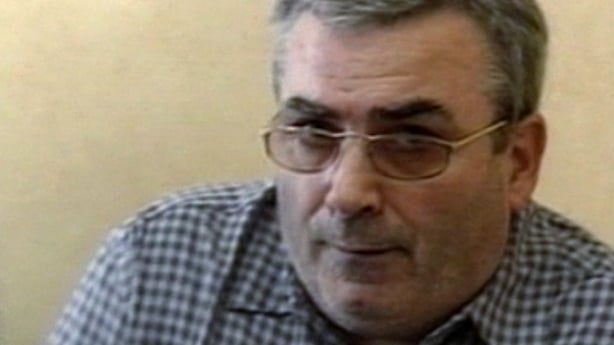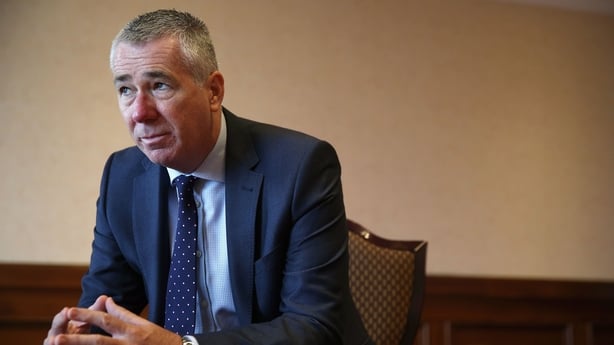Prosecutors in Northern Ireland have announced they will not press charges against 16 people alleged to have been involved in three murders and other crimes following an investigation into the British army agent codenamed Stakeknife.
The suspects the Operation Kenova investigation team had recommended for prosecution were nine former members of the Provisional IRA, six former British soldiers and a retired RUC officer.
In a statement, the Public Prosecution Service said there was insufficient evidence to provide a reasonable prospect of conviction for any of those named.
Operation Kenova was established in 2016 to investigate the activities of the agent known as Stakeknife.
He was west Belfast man Freddie Scappaticci, a former senior member of the IRA's internal security unit, which was responsible for identifying and killing alleged informers, and who died in April.
It also examined the activities of other IRA members and former British military personnel and RUC officers who were connected to the agent.
The investigation team had recommended prosecutions for 16 men named in five files submitted to the PPS, but prosecutors ruled that the "evidential test" had not been met.
Prosecutors said a significant amount of material submitted by Operation Kenova compromised intelligence records, which it considered there was no reasonable prospect of being admitted as evidence in court.
None of the victims who were the subject of the files have been named by the PPS at the request of their families.
The decisions not to prosecute were taken in relation to:
- Three former IRA members in connection with a murder in 1981
- Two former IRA members in connection with a murder in 1987
- Two former IRA members in relation to a murder in 1993
- Two former IRA members in connection with the false imprisonment of, and conspiracy to murder, one victim in January 1990
- Six former British military personnel and one former RUC officer in connection with allegations of perverting the course of justice and misconduct in public office
The former IRA members had been recommended for prosecution in relation to their roles in murder, conspiracy to murder or false imprisonment of individuals the organisation accused of being informers.
The former British military personnel were members of or advised the Force Research Unit, a secret British army unit that recruited and managed agents, and more specifically their role in the handling and management of Stakeknife.

Read more:
Over 200 murders investigated under Operation Kenova
The retired RUC officer was reported to the PPS for his role in an investigation into an incident of false imprisonment and an allegation that they conspired to pervert the course of justice in respect of that investigation.
PPS Director Stephen Herron said he wanted to assure victims, their families and the wider public that the decisions "were taken carefully, impartially and wholly independently".
"I acknowledge that today's decisions will be a reminder of the painful and harrowing circumstances of how some Operation Kenova families lost a loved one, and we are seeking to minimise any further trauma caused by revisiting these cases publicly," he said in a statement.
"The challenges in prosecuting legacy cases are well known. The events with which these decisions are concerned took place several decades ago and the witness and forensic evidence available was limited.
"A significant body of the material that prosecutors considered included intelligence records ... it was not possible to use this material in these cases in order to bring prosecutions.
"Such material may, however, allow Operation Kenova to form a view as to what happened in particular cases and in providing answers to questions that families may have about the circumstances in which they lost their loved one."
To date, no one has been prosecuted as a result of the seven-year investigation that has cost almost £40 million.

Head of Operation Kenova throughout the investigation was Jon Boutcher, who recently left the role to take up the position of Chief Constable of the PSNI.
His successor, Iain Livingstone, said he acknowledged the decisions made, but added that it was important to clarify that the individuals considered for prosecution in the files were supplementary to the main focus of the operation - the activities of an alleged army agent codenamed Stakeknife.
"Kenova considers that we have gathered strong and compelling evidence in relation to that individual. Such evidence has been passed to the PPS and will form the basis of our interim and final reports," he added in a statement.
"We recognise that legacy investigations and prosecutions can be extremely challenging, but I understand that for a number of people today's decisions will be disappointing.
"We have spoken to the families affected by these decisions to reaffirm our absolute determination to deliver the truth regarding what happened to their loved ones.
"In cases such as the ones today, where there are to be no prosecutions, Kenova intends that the truth will be established through our interim, final and family reports."
The PPS said decisions on whether to prosecute 21 others named in ten further Kenova files will be issued early next year.
Any decisions to prosecute would not be subject to a British government ban on prosecutions for Troubles related killings providing it is made before a legal deadline of 1 May.
Announcement is not a surprise - families
Victims' families were informed of the decisions shortly before a public statement was issued.
Lawyers representing relatives of a number of people murdered by the IRA whose killings were investigated by Operation Kenova have asked for a review of the decisions not to prosecute.
In a statement, Kevin Winters and Co said the announcement that no one will face prosecution comes as no surprise.
It said "all lingering hopes of criminal proceedings disappeared" when Freddie Scappaticci died in April.
"Today's decision presents as a lost opportunity to explain why the PPS took over two years in some cases to reach these decisions," the statement added.
"Specifically many people want to know why the decisions could not have been made long before Scappaticci died. We have written to the PPS three weeks ago asking for clarification on what they knew about the main suspects health condition in the lead up to his demise.
"Today was a chance to help dispel myth and rumour on his death and the timing out of decisions after his passing.
"The communication today only serves to fuel suspicion on the death of Scappaticci."







